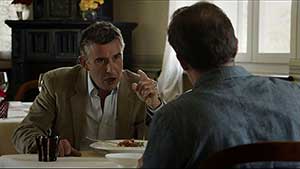It's perhaps a bit self-indulgent to write this letter to you. There's so much else that is essential to the success of The Trip to Italy: the majestic seaside vistas, the stunning culinary creations, the moving soundtrack from Richard Strauss and, yes, Alanis Morrisette. But, first and foremost, I'm a Steve Coogan fan, and I was drawn to this film – and its predecessor, The Trip – because of your involvement.
It's often hard, here on the left side of the Atlantic, to keep up with your body of work. You'd think that your most successful British show, The Alan Partridge Show (one of the great comedy series of all time, British or otherwise), would be more readily available over here. But, no. We get The Office, Extras, and Little Britain—but no Partridge. Even the feature-length Alan Partridge film was late in arriving to the New World, and, when it did, appeared only on a modest number of screens. So The Trip films, for me, are like a distant cousin's wedding or school reunion: a chance to catch up with my faraway friends and loved ones.
Now that I've revealed my bias, my thoughts on The Trip to Italy might seem obvious and irrelevant. But the film itself plays out behind a veil of irrelevance. It meanders, digresses, loiters, philanders (both figuratively and literally)—but all to a higher purpose. So of course I loved it. Of coursed I loved your performance. Obviously.
In the first Trip film, which followed you and your travel companion Rob Brydon on a restaurant tour of Northern England, you each played to your respective strengths: Brydon as earnest, motor-mouthed family man; you as the acerbic bachelor injured by his failed ambitions. Here, in subtle degrees of patience and composure, your performance has evolved. The Steve Coogan in this film is a different Steve Coogan than the one who appears in the first. Which is significant, considering how difficult it is, in the first place, to play a plausible version of oneself onscreen. We get a different Rob Brydon, too (though his transformation is expressed primarily through action). While the role-reversal conceit might seem a little too familiar – shades of a body-swap comedy – your delivery makes it work.
It's a tribute to you, Brydon, and director Michael Winterbottom, that a two-hour film built from a series of semi-improvised conversations on topics ranging from the number of Batmen Michael Caine has buried to Byron's culpability in the death of Percy Bysshe Shelley is able not just to maintain its velocity, but to hit a few genuinely affecting beats. The comedy is broad, but the sentiments aren't. Brydon's marital struggles don't play out the way one imagines they will, and remain, by the end of the film, frustratingly (and credibly) unresolved. Your own minor crisis concludes in a quiet scene aboard a small yacht floating in the sunset off the southern Italian coast: a very simple conversation between father and son, unadorned with movie-star impressions or punch-lines or self-sabotaging sarcasm. It unfolds like the thousand other father/son conversations that preceded it, but in the context of your character's arc through both films, feels sort of profound.
All this moving stuff in a film that delivers, consistently, lines like this:
"Where do you stand on Michael Bublé?"
"On his windpipe?"
Whether you're playing yourself, or Alan Partridge, or Paul Calf, or Tommy Saxondale, it's exactly this sort of alchemic mixture of sympathy and antipathy that makes your characters so likably unlikable, so hilarious, so human.
The Trip to Italy achieves this balance, too. Hopefully, like all superior sequels, it will spawn a slightly disappointing concluding chapter. Might I suggest the wintry climes of central Ontario?
Sincerely,

Jared







